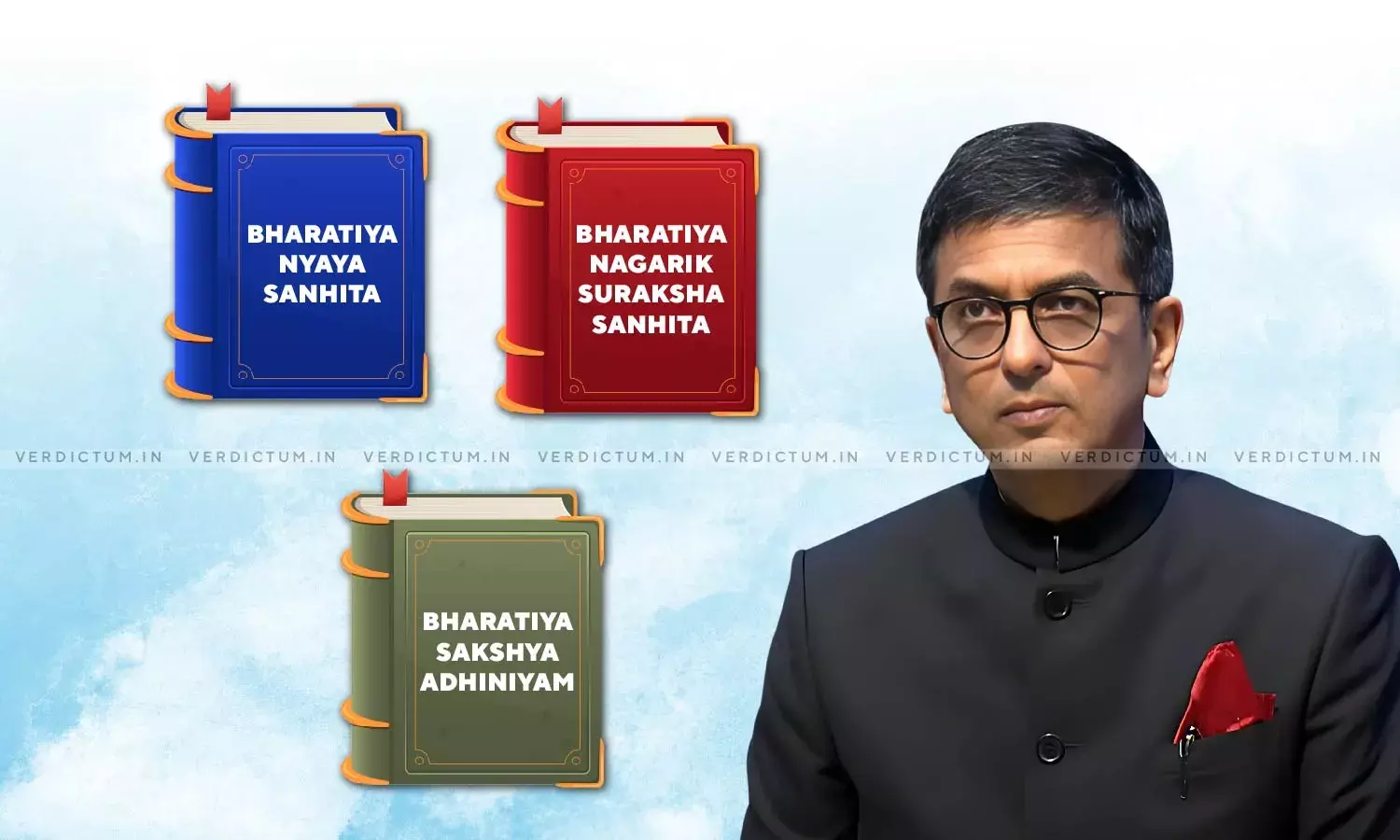Enactment Of New Criminal Laws Is A Significant Step Towards Modernising Justice System: Chief Justice DY Chandrachud

The Chief Justice of India D.Y. Chandrachud hailed the three new criminal laws enacted by Parliament to replace the Indian Penal Code, the Code of Criminal Procedure and the Indian Evidence Act, emphasizing their comprehensive nature covering substantive crime, procedure, and evidence. He lauded the digitization efforts aimed at modernizing the justice system, noting that every stage of a criminal investigation will be recorded digitally under the proposed legislation.
The Chief Justice was delivering a lecture at the 20th DP Kohli Memorial Lecture, which focused on the theme "Adopting Technology to Advance Criminal Justice."
He said, “The new criminal laws enacted by Parliament encompass substantive crime, procedure and evidence. These laws aim at digitising various aspects of criminal procedure. This is a significant step towards modernising the justice system. From the initial registration of a First Information Report to the final delivery of judgement, every stage of a criminal investigation is slated to be recorded digitally under the purview of the proposed legislation. This comprehensive approach ensures a seamless flow of information and is intended to facilitate better coordination and collaboration among stakeholders involved in the investigative and adjudicatory processes.”
CJI Chandrachud discussed the challenges posed by digital transformation, such as cybercrime and data encryption, which require advanced forensic capabilities and international cooperation.
He proposed reengineering the investigative framework by forming multidisciplinary teams comprising law enforcement officers and domain experts to tackle sophisticated criminal networks effectively. He said, “To deal with these innovations in criminal activities, we must rethink our investigative framework. The practice of allocating a case to an Investigative Officer and his local team for investigation must be relooked to meet the challenges of sophisticated criminal networks.”
The lecture emphasized the integration of technology into criminal justice processes, including evidence analysis through platforms like the Network for Evidence Tracing, Research, and Analysis Lab (NETRA).
CJI Chandrachud underscored the importance of striking a balance between search and seizure powers and individual privacy rights, especially concerning digital evidence.
He discussed recent legislative reforms aimed at digitizing criminal procedures, such as electronic issuance of summons and virtual testimonies. He added, “Summons can now be issued electronically, and testimonies from witnesses, experts, accused individuals, and other parties may also be presented virtually. This innovation eliminates the need for physical documentation and enables swift communication between law enforcement agencies, courts, and individuals involved in legal proceedings. It will obviate the delay in bail orders reaching the jail authorities and in recording witness depositions. Similarly, the authorization for presenting testimonies virtually opens up new avenues for participation in legal proceedings, allowing contributions to the process from remote locations.”
The lecture highlighted the transformative potential of artificial intelligence in crime detection and investigation, along with the importance of ethical considerations and safeguards against biases.
The Chief Justice concluded by expressing confidence in leveraging technology to reduce case pendency and ensure citizen-centric justice, provided robust safeguards are in place to protect individual rights and promote transparency.
The Central Government had notified that the new criminal laws now known as 'The Bharatiya Nyaya Sanhita, 2023', 'The Bharatiya Nagarik Suraksha Sanhita, 2023' and 'The Bharatiya Sakshya Adhiniyam, 2023' replacing Indian Penal Code 1860 (IPC), Code of Criminal Procedure, 1973, and the Indian Evidence Act, 1872 (IEA) shall come into force on July 1, 2024.
Recently, the Union Ministry of Law and Justice, Legislative Department, published the official Hindi translations of the three criminal laws in the Gazette Of India under the provision of clause (a) of sub-section (1) of Section 5 of the Official Languages Act, 1963 (19 of 1963).


